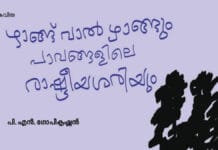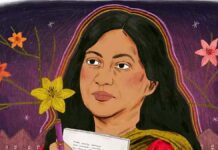Unniyarcha is a celebrated tale from Kerala’s folk ballad tradition, specifically the Vadakkan Pattukal, which narrates the exploits of medieval warriors of the Malabar region. The text presents Unniyarcha as a legendary woman warrior skilled in the martial art of Kalaripayattu. Her character embodies courage, dignity, and martial discipline, standing as a rare female figure in a predominantly male warrior culture.
Unniyarcha and Aromal Unni is a ballad from the Vadakkanpattukal. It tells of an ominous dream that Unniyarcha had in her sleep, which was about her brother, Aromal Unni, going out for a duel. The dream forebodes evil for Aromal in his maiden duel. Hence, Unniyarcha believes that it is her duty to stop him before he sets out from home. The ballad is translated from Malayalam by Kamala Das.
The narrative introduces Unniyarcha within the Puthooram household, a family of famed warriors, and emphasises her beauty, bravery, and training. Unlike passive portrayals of women in traditional folklore, Unniyarcha actively participates in martial encounters, often outwitting and overpowering male adversaries. Her encounters highlight not only her skill but also her wit, particularly in situations where she faces betrayal or danger.
A central episode recounts her defiance against those who underestimate her capabilities. She wields her sword with both precision and moral authority, ensuring that her strength is not reduced to violence alone, but is instead aligned with justice and self-respect. Through her struggles and victories, the text underscores themes of honour, gender, and power. Importantly, her presence unsettles patriarchal expectations, turning her into both a cultural icon and a symbol of resistance.
Summary
The passage situates Unniyarcha in a moment of profound unease, “long past the midnight hour,” when she awakens from an ominous dream foretelling danger for her brother, Aromal Unni, the “handsomest jewel of the Puthooram clan,” who is about to face his first duel. The scene is rich with ritual and domestic detail, foregrounding her dual roles as a woman of the household and as a vigilant guardian of her family’s honour.
Her immediate response to the dream is not fear alone but action. She turns to prayer, invoking clan deities, ancestral spirits, and battlefield souls, thus linking her private anxiety to the collective ethos of warrior kinship. The act of worship shows her deep connection to familial and cultural traditions while also emphasising her agency in a society that often sidelines women’s voices.
Following this, she engages in ritualised domestic duties: straightening her clothes, tidying her hair, lighting lamps, sweeping the courtyard, and preparing food. These gestures highlight her role as caretaker and custodian of household order, yet they are charged with urgency, almost as if the everyday routines themselves become protective talismans against misfortune.
When she wakes her parents with gentleness, she justifies the premature preparation of breakfast by revealing her troubling vision. Her father’s dismissal — “dreams are untrustworthy” — and his reminder of her pregnancy reflect the patriarchal scepticism that seeks to confine her to the private, domestic space. Yet her emphatic response, “Oh, but I must go… before it is too late,” demonstrates her defiance of such restrictions and her determination to intervene in male affairs of war and honour. This section of the poem portrays Unniyarcha as a woman who moves between the domestic and the martial worlds, embodying both familial duty and an uncompromising will to act when her brother’s life and family honour are at stake.
Analysis
The significance of Unniyarcha lies in its ability to transcend the boundaries of folklore and move into the realm of cultural myth-making. The excerpt reveals the narrative power of the ballad form, where ordinary domestic life and extraordinary acts of foresight and resolve are interwoven. The poet’s choice to begin “long past the midnight hour” sets a liminal mood: a time associated with visions, anxieties, and messages from the unseen. The dream itself functions as a dramatic device, foreshadowing tragedy and giving Unniyarcha a prophetic voice that challenges the dismissive rationalism of her father. From a literary perspective, the text’s structure blends descriptive balladry with action-driven episodes, keeping alive the oral traditions of Kerala while embedding gendered heroism within it. The rhythm and imagery are typical of folk songs—repetitive, mnemonic, and vivid—designed to be recited and remembered across generations.
Thematically, the poem foregrounds gendered tensions. Unniyarcha represents a radical break from conventional representations of women in pre-modern South Indian narratives. She is not merely a consort or a background figure but the centre of heroic action. Her mastery of Kalaripayattu turns the body itself into a site of empowerment, reflecting both the martial traditions of Kerala and the possibility of female agency within them. Unniyarcha’s role as a pregnant woman, expected to be confined to care and obedience, collides with her inner compulsion to act. The father’s remark that she “cannot walk your way home” reinforces cultural constraints on women’s physical and social mobility. Her resistance to this — insisting that she must stop Aromal Unni — exemplifies her subversive agency. In this way, the poem problematises the traditional division of roles between men and women, presenting a heroine who refuses to be silenced by either pregnancy or patriarchal authority.
From a critical standpoint, the tale engages with social commentary, subtly critiquing patriarchal control by portraying a woman who asserts autonomy without severing ties to her family or cultural identity. The text can be read through feminist and cultural lenses. Unniyarcha emerges as a proto-feminist figure whose intuition, determination, and ritualised acts position her as a guardian of both domestic and martial spheres. At the same time, her reliance on dream-vision and prayer reflects the cultural value placed on spirituality and ancestral connection, situating her actions within the broader ethos of Vadakkan Pattukal. She is both a dutiful member of the warrior household and a transgressive figure who claims the right to fight, resist, and lead.
Stylistically, the poem balances descriptive detail with symbolic resonance. The meticulous description of her rituals — saluting the sun, sweeping the courtyard, cooking rice with lentils, preparing gruel — functions both realistically (anchoring her as a dutiful woman of the household) and symbolically (domestic rituals elevated into acts of protection and resistance). This layering of meaning is characteristic of oral folk traditions, where repetition and everyday imagery serve both mnemonic and cultural functions.
In the context of cultural studies, Unniyarcha also serves as a communal text, preserving martial heritage, offering moral exemplars, and sustaining regional pride. In modern readings, she has been celebrated as a proto-feminist icon, her defiance and courage aligning with contemporary discourses of women’s empowerment. In modern appreciation, this passage highlights the resilience of women in oral tradition — often dismissed as secondary characters, but here given depth, authority, and urgency. It is this complexity — the fusion of ritual, prophecy, resistance, and duty — that has made Unniyarcha a legendary figure in Kerala’s cultural memory.
Unniyarcha is not merely folklore but a layered narrative that resonates across literary, historical, and cultural domains. Its enduring relevance lies in the figure of a woman who redefines courage, honour, and agency, making her both a product of tradition and a timeless symbol of resistance.




























